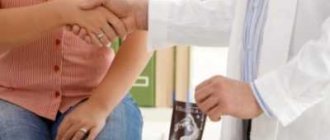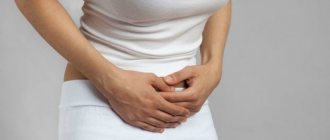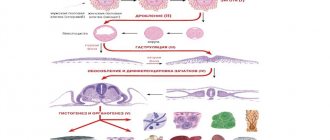What is diarrhea and its types
If in a healthy person diarrhea, regardless of its causes, is a pathology, then in a pregnant woman it may be part of a physiological process associated with her position. But diarrhea can also be a sign of certain diseases and disorders of the body. Therefore, it is very important to differentiate the manifestation of diarrhea as normal and as pathology.
Diarrhea is when a person has bowel movements more than 3 times a day. The feces are liquid, often with a foul odor and foreign impurities (blood, mucus). The color of stool may vary depending on the cause of the diarrhea.
There are several types of diarrhea:
- Secretory - appears due to a violation of the secretion of sodium and water, and a decrease in the absorption of the intestinal walls. The stool is very watery and usually green in color.
- Hyperexudative – appears in various gastrointestinal pathologies (Crohn’s disease, salmonellosis, intestinal carcinoma, ulcer). Foreign impurities may be found in the stool.
- Osmolar is a pathological process that manifests itself due to impaired absorption of certain elements: dysbacteriosis, enzyme deficiency, morphological transformation of the gastrointestinal mucosa. The stool is characterized by the presence of a large amount of undigested food.
- Hyper- and hypokinetic – a consequence of gastrointestinal motility disorders after exceeding the dose of laxatives. This form of diarrhea can occur as a result of anxiety and irritable bowel syndrome. Characterized by copious excretion of feces in the form of liquid gruel.
Types of pathological diarrhea
But besides hormones, there are other possible causes of diarrhea, which you need to be able to distinguish from infection. In parallel with stool disturbances, bloating and pain in the abdomen, frequent bowel movements with a strong fetid odor, foam and mucus occur, frequent vomiting and headaches occur, and a possible increase in temperature. The development of this type of diarrhea is dangerous for the expectant mother and can threaten the fetus, especially if the diarrhea is prolonged and leads to toxicosis and dehydration.
The following forms of diarrhea may develop:
Osmolar, which is associated with impaired absorption of nutrients in the intestines. This type is provoked by dysbacteriosis, such as lactase deficiency or celiac disease, enzyme dysfunction or inflammation of the intestinal mucosa. Loose and foamy stools with undigested food particles are typical.- Secretory diarrhea is formed due to damage to the intestinal walls, which release fluid into the lumen without absorbing nutritional components. This is typical for intestinal infections. With this type of diarrhea, green stool appears and the contents are watery.
- Exudative diarrhea occurs with shigellosis and salmonellosis, inflammatory bowel disease (nonspecific ulcerative colitis or Crohn's disease). The diarrhea will be watery, mixed with pus and blood, and severe abdominal pain and cramping often accompany the diarrhea.
- Hyperkinetic diarrhea is formed against the background of intestinal motility disorders, occurs against the background of drugs and stress, and leads to frequent bowel movements of small volumes of liquefied stool.
Signs of diarrhea during pregnancy
Signs of diarrhea during early pregnancy:
- increased gas formation and bloating;
- pain attacks in the lower abdomen;
- in case of intestinal infection or poisoning, the temperature may rise, weakness, nausea, and headaches may appear;
- With heavy bowel movements, there may be a strong feeling of thirst, drying of the mucous membranes of the nose and mouth.
Why is diarrhea dangerous in early pregnancy?
If it is diarrhea caused by hormonal changes, it is not dangerous for the woman and the fetus, but if it is for other reasons, then the risks are determined by the severity of the diarrhea. If the diarrhea is short-lived and goes away within a day, there is no danger, the body fully compensates for the losses. If this is an infectious cause, viral infections are much more dangerous; they can damage the fetus, while microbial infections cause toxicosis, which can disrupt the course of pregnancy and provoke miscarriage. These problems must be treated strictly under the supervision of a doctor. If diarrhea becomes chronic, we are most likely talking about an exacerbation of pathologies of the stomach or intestines, which leads to the loss of vitamins and minerals necessary for the body of the mother and fetus.
What else is dangerous about diarrhea in the early stages:
- Intestinal spasms and active peristalsis lead to an increase in the tone of the uterus, which can lead to detachment of the fertilized egg and death of the embryo.
- Infectious agents, penetrating into the fertilized egg, can threaten developmental defects and serious damage to the child.
- An increase in temperature in the early stages of pregnancy is also dangerous in terms of the development of complications.
- Frequent diarrhea can lead to severe dehydration, loss of electrolytes, cramps, malaise, and heart and kidney problems.
Alena Paretskaya, pediatrician, medical columnist
just today
( 51 votes, average: 4.55 out of 5)
What can you drink for headaches while breastfeeding?
Hay fever during pregnancy: how to treat it, effect on the fetus
Related Posts
Causes of diarrhea during pregnancy
Factors that cause diarrhea early in pregnancy may include:
- Dietary disorder. During pregnancy, women often change their taste preferences and begin to eat foods that they did not eat before conception. When combining incompatible products, stool may be disrupted.
- Toxicosis, changes in hormonal levels due to pregnancy. Restructuring the body can cause intestinal dysfunction and provoke diarrhea.
- Excessive emotional stress and anxiety that pregnant women face can affect the functioning of the gastrointestinal tract.
- Food poisoning , which occurs when eating spoiled foods. In addition to diarrhea, the patient experiences vomiting and nausea. Intoxication of the body occurs.
- Intestinal infections (cholera, dysentery, rotavirus, etc.) are dangerous pathologies that cause diarrhea. They can greatly affect the course of pregnancy, so the first signs of the disease should be a reason to immediately consult a doctor.
- Worms can appear due to poor hygiene, improper food preparation, and consumption of unwashed fruits.
- gastrointestinal diseases often provoke frequent loose stools.
- When using laxatives in abnormal doses, diarrhea may occur. After stopping taking such medications, it goes away.
Causes
The reasons why diarrhea occurs during early pregnancy can be completely harmless or require medical intervention. It happens that a woman confuses such conditions and may worry unnecessarily when there is no reason for concern, and, conversely, does not rush to see a doctor when consultation with a specialist is necessary.
Many regard diarrhea as a sign of pregnancy in the early stages, and, in principle, for good reason. Already in the very early stages, even before the delay, the woman’s body begins to actively produce the pregnancy hormone progesterone, which provokes diarrhea. In this case, the stool disorder is not severe, there is a slight dilution of the stool, bowel movements two to three times a day. Such loose stools during early pregnancy are normal; everything else is a pathology that requires medical intervention.
What other causes of diarrhea during early pregnancy are:
- Elementary poisoning from poor quality food. During the period of bearing a child, it is especially important to monitor the quality of the products consumed and their expiration dates. Just one sandwich with sausage that has been left in the refrigerator can lead to such sad consequences as diarrhea during early pregnancy.
- Toxicosis. In addition to the usual signs of toxicosis, such as nausea and vomiting, sometimes, in the early stages of pregnancy, diarrhea is added. In principle, this is normal, but the situation requires some therapy, which we will discuss below
- Digestive disorders can be caused by changes in a pregnant woman's diet. Everyone knows that in an “interesting situation” taste preferences change and you want something special, sweet, salty, spicy, or even some unusual combination of foods
- Diarrhea in the early stages can occur with an ectopic pregnancy. But you should not regard loose stools as a sure sign of this pathology.
- Diarrhea and vomiting in early pregnancy occur not only as a result of toxicosis. Together with temperature, they indicate an infectious disease. This is perhaps the most dangerous cause of illness. The infection can be different, from rota virus to E. coli, staphylococcus, salmonellosis. Of course, such a pathology requires the intervention of a competent specialist, especially during pregnancy. Many medications are contraindicated during this period, and only a doctor can provide competent therapy.
- In an “interesting situation,” an exacerbation of chronic diseases of the gastrointestinal tract may occur. Is diarrhea possible in early pregnancy during exacerbations? Easily. Especially in combination with eating disorders.
- Sometimes, as soon as a woman finds out that she will soon become a mother, she begins to take care of the child’s health, leads a healthy lifestyle and eats a lot of healthy fruits and vegetables. If the expectant mother did not eat this way before pregnancy, loose stools are inevitable. Fresh vegetables and fruits have a very high fiber content, which significantly stimulates peristalsis, and many of them have a laxative effect.
- While carrying a child, it is not uncommon for there to be surges in blood pressure; it either rises or, on the contrary, drops sharply. This condition can affect stool, however, in this case, diarrhea goes away very quickly without additional drug intervention.
- Vitamins and microelements prescribed by your pregnancy doctor can also cause loose stools. In addition, iron-containing drugs cause a phenomenon called black diarrhea. The necessary iron is absorbed by the body, and its excess is excreted in the stool, coloring it. Black stool can also occur if bleeding has started somewhere in the body. This is very dangerous and requires immediate medical attention. In general, observe the character of the stool. If in the early stages of pregnancy you experience diarrhea with mucus, blood, foam, or unusual color, consult a doctor immediately. Find out why green diarrhea is dangerous on our website.
- Does diarrhea occur in early pregnancy due to stress and nerves? Yes, this is a fairly common occurrence. During the period of gestation, a woman is especially susceptible to emotional experiences, and, as a result, loose stools.
Dangers of Diarrhea During Pregnancy
Diarrhea at the beginning of pregnancy is characterized by a persistent course, which leads to dehydration and, as a consequence, vomiting. Toxicosis during this period causes a decrease in appetite, a lack of desire to drink, so as not to provoke the urge to vomit. This is a typical scenario for complications. During pregnancy in the second and third trimester, diarrhea (diarrhea) is more easily tolerated.
Dangers of Diarrhea:
- Dehydration with diarrhea leads not only to the loss of fluid, but also important vitamins and minerals.
- Frequent intestinal contractions increase uterine tone and contraction of the uterus. And this threatens the woman with spontaneous abortion or miscarriage.
- When the body is intoxicated due to diarrhea, pathological processes of fetal development and disruption of the formation of the central nervous system can be observed.
Prevention
If before the onset of diarrhea the nutritional rules were not followed, then if an unpleasant symptom appears, it is imperative to reconsider the diet. During pregnancy, you are already responsible not only for your health, but also for your unborn child.
To do this, you need to treat all diseases in a timely manner, and also not load the body with food, which can negatively affect the condition.
Despite the benefits of many products, they should also be included in the diet carefully.
A large amount of plant foods will not be beneficial, since such foods are high in fiber, which relaxes the intestines and causes diarrhea.
In order not to treat diarrhea, you will need to adhere to the prevention of infections and poisoning:
- Buy only high-quality and fresh food.
- Eat only fresh dishes; it is recommended to cook them for the whole day, and eat a new dish the next day.
- Monitor the expiration dates of the products in the refrigerator and more.
- All vegetables and fruits must be thoroughly washed before consumption.
- Meat, fish, dairy and other types of products should be carefully processed using temperature.
- You should avoid fast foods and public eating places during pregnancy.
- Always wash your hands before eating.
Using these simple rules, infections and poisoning will not appear and will not cause diarrhea in a pregnant woman.
First aid for diarrhea
If there are no other symptoms other than diarrhea, you can take the first steps at home . First you need to skip a few meals. In this case, you need to increase your fluid intake . Portions should be frequent and fractional, so as not to cause vomiting by drinking too much. The best remedies for the body’s loss of minerals and fluids are still water, tea, a decoction of chamomile or St. John’s wort, as well as Regidron.
Next, you should seek help from a specialist .
He will order additional tests to help determine what caused the diarrhea and determine a treatment regimen.
Treatment of diarrhea in the early stages of pregnancy
Pregnant women should be treated with medications only as prescribed by a doctor. For frequent, loose stools, medications with absorbent properties are usually prescribed: Smecta, activated carbon, Nifuroxazide. These are the most gentle drugs for the baby and his mother, effectively combating diarrhea without disturbing the intestinal microflora. In addition, it is important to maintain the level of water and salt balance in the body. To do this, you should drink as much liquid as possible (tea, compote), and also take Enteredez or Regidron saline solution. You can prepare a saline solution yourself by adding a teaspoon of sugar and salt to a glass of boiled water. These funds will help maintain the water glucose-salt balance, reduce attacks of nausea and vomiting.
Depending on the cause of diarrhea, a course of treatment is prescribed. The doctor will prescribe gentle medications that pregnant women can take for diarrhea. For infectious diseases, you cannot do without antibacterial agents, which are prescribed individually for each case, taking into account the woman’s condition, the severity of the disease, and drug tolerance. For neurogenic intestinal disorders, sedatives (motherwort, mint) are prescribed.
How to treat diarrhea during pregnancy
Therapy aimed at eliminating diarrhea can be inpatient or home .
Hospitalization in a hospital is mandatory if diarrhea is accompanied by stomach pain, weakness and malaise. In case of severe intoxication, infusion therapy is prescribed. If diarrhea is caused by severe food poisoning, gastric lavage is performed, after which the patient needs absolute rest.
Drug therapy
For uncomplicated diarrhea during pregnancy, diarrhea can be treated at home with drugs that do not harm the pregnant woman and the fetus. What can you do for diarrhea during pregnancy?
- Activated carbon is the most budget-friendly product that should be taken at the rate of 1 tablet per 10 kg of body weight. It removes toxins and normalizes stool.
- Smecta is a powder that needs to be dissolved in 100 g of warm water and drunk in one go.
- Regidron is a remedy that prevents dehydration of the body. Dissolve 1 sachet in 1 liter of water and take in small portions every 5-10 minutes.
- Enterosgel – frees the intestines from harmful elements, removes toxins.
To normalize the functioning of the gastrointestinal tract, the doctor may prescribe enzyme agents: Pancreatin, Creon, Mezim.
Important! All medications are taken strictly according to instructions. They are appropriate for diarrhea that is not very bothersome. In complicated cases, independent therapy is not acceptable.
Diet for diarrhea in pregnant women
At the first signs of diarrhea, a woman in the early stages of bearing a child should limit herself to drinking plenty of fluids . This will save the body from losing water. It is allowed to introduce white bread crackers into the diet.
On the second day, the menu may be enriched with unleavened porridges made from rice and oatmeal. It is useful to drink rice broth for diarrhea. It promotes normal feces formation. To prepare it you need to take 1 teaspoon of rice and ½ liter of water. Simmer over low heat for 40 minutes. Drink ¼ cup of the strained broth every 3 hours.
You can normalize your intestinal microflora with yogurt. It can be taken at different stages of pregnancy. It should not contain additives so as not to cause irritation of the intestinal mucosa.
Blueberries or viburnum berries, as well as pears (baked, dried, or a decoction of them) will help reduce the number of bowel movements.
What not to eat if you have diarrhea in pregnant women:
- meat products;
- spicy and salty dishes;
- fresh fruits and juices from them;
- sparkling water;
- coffee;
- fermented milk products and milk.
To avoid activation of intestinal motility, it is better to avoid broths, soups and other liquid dishes.
Folk remedies for diarrhea
Not all non-traditional methods of treating diarrhea can be used by pregnant women. Before using any prescription, you should consult your doctor .
- Take warm boiled water (100 ml), dilute starch in it (1 teaspoon). Drink in one go.
- Peel 1 pomegranate, pour 200 ml of boiling water over the peel. Infuse the product for about an hour and drink instead of tea.
- Prepare blueberry jelly. You can take it 2 times a day, 1 glass.
- Grind walnut leaves (1 tablespoon), boil them in ½ liter of water for 15-20 minutes. Drink the decoction 3 times a day, 1 tbsp. spoon.
If the factor causing diarrhea is stress and emotional tension, it is useful to take decoctions that have a sedative effect. Mint or motherwort are suitable for preparing the drink.
Symptoms of diarrhea
Depending on the severity of diarrhea, they talk about possible harm to health and complications. If diarrhea occurs as a result of poor nutrition, the symptom is painless and goes away quickly without special treatment. Stomach upset of an infectious nature requires careful attention and surgical therapy. Chronic diarrhea lasting a month indicates serious gastrointestinal disorders.
Diarrhea during pregnancy is marked by symptoms:
- Frequent loose stools;
- My stomach is churning;
- Watery stool;
- Lack of appetite;
- Discomfort in the stomach after eating in the form of heartburn, nausea;
- Cramps, pain in the stomach;
- Aching, sharp, prolonged pain in the abdominal area;
- Weakness;
- Drowsiness, apathy;
- There is an increase in body temperature;
- A sign of dizziness, darkening of the eyes when changing body position.
If you have diarrhea, a woman should monitor her well-being. If the condition worsens, if there is a tug, a stomach ache, loose stools with water, or the baby in the stomach behaves restlessly (calms down), contact an ambulance immediately. Self-medication during pregnancy is fraught with consequences for the health of the expectant mother and child. Before using medications to relieve unpleasant symptoms, consult your doctor.
Prevention of diarrhea during pregnancy
To protect yourself from such a nuisance at the beginning of pregnancy, a woman must adhere to some rules:
- normalize nutrition - food should always be fresh and thermally well processed;
- do not drink raw water;
- take care of your own hygiene;
- wash vegetables and fruits before eating;
- do not eat in questionable places.
What to do with loose stools during pregnancy, what can you take?
If the stool has become liquid, without being a harbinger of labor in the third trimester (as, indeed, in earlier ones), it is important to take appropriate treatment. This will help cope with diarrhea, as well as related problems, for example, if a woman vomits. It is recommended to use medicines, folk recipes, and also normalize nutrition.
Speaking about the most effective drugs, pay attention to:
- The use of white and black activated carbon - both at the initial stage and after completion of the main course. These products perfectly adsorb toxic components and remove them from the intestinal area in the shortest possible time. An additional advantage of the drugs should be considered a gentle effect exclusively on the mother’s body - in the intestinal area.
- Using Smecta, which increases the ratio of mucus produced by the intestines. It is she who subsequently envelops pathogenic bacterial components, as well as viruses and toxins. The use of Smecta allows you to remove them from the female body naturally. The advantage of using such a drug is that it does not cross the placental barrier.
- You can also drink Enterosgel or hydrogel, which are in the category of enterosorbents. Under its influence, harmful components are removed not only from the intestines, but also create obstacles to their absorption into the bloodstream. In addition, Enterosgel helps to improve the functioning of the stomach, liver and kidneys, normalize indicators in urine and blood.
The use of each of the presented drugs is also effective due to the ability to protect the intestinal walls from inflammatory processes. We should not forget about stopping the formation of erosive defects on the mucous surface of the digestive organs - they very often appear as a result of prolonged diarrhea (lasting the second week).
As noted earlier, some home remedies can be used. Blueberry jelly, as well as an infusion prepared from pomegranate peel, are approved for use during pregnancy. Diarrhea can be treated by using a decoction of mint and motherwort: for this, the herbs are brewed in equal proportions.
Most often, no more than one week is enough for a complete cure.
If we talk about diet, then you will need to stop eating foods that irritate the intestines. For example, to eliminate loose stools, it will be useful to stop eating fresh vegetables and fruits for several days - this will not affect the child in any way, but will normalize the functioning of the gastrointestinal tract.
During acute diarrhea, it is unacceptable to eat fatty and spicy foods or drink milk. The ban applies to the use of fatty sour cream and cottage cheese, strong broths. It is better to create a menu for the first, second and third trimester based on rice, buckwheat and oatmeal porridge. Low-fat varieties of meat and fish, pre-cooked, will be no less useful.
What to do if diarrhea occurs in early pregnancy?
It’s trite but true: first you need to calm down. If it is impossible to immediately go to the doctor, you can use harmless means.
In particular, drinking plenty of liquid will help prevent dehydration, and clean water can be replaced with infusion of St. John's wort or chamomile.
Taking activated carbon, smecta, enterosgel, and rehydron will help stop the visible manifestations of diarrhea, as well as relieve intoxication of the body. Just before taking any drug, carefully read the instructions for the drug you intend to take.
If the instructions say that pregnancy is a contraindication for taking the drug, then you should not use it. And when the opportunity arises to consult a doctor, you should not neglect medical help.
The specialist will most likely suggest examination, in particular, a general blood test, biochemical blood test and stool test for dysbacteriosis. The results of the examination will become the basis for prescribing treatment.
List of Acceptable Medicines
In 70% of cases of diarrhea during pregnancy, treatment is done without antibiotics. At the same time, every second woman is prescribed complex therapy to restore water-salt balance, normalize gastrointestinal functions, and destroy pathogens (if necessary). Among the things that pregnant women can do for diarrhea, sorbents are first prescribed. The drugs fight dehydration by removing toxins. Available without a prescription, taken at the first sign of diarrhea. The necessary complex treatment will be prescribed by the doctor.
- adsorbents – white, black (activated) carbon, smecta;
- against dehydration - rehydron;
- restoration of electrolyte balance, drip - trisol, ringer's solution, disol (for severe poisoning);
- probiotics;
- enzymes to facilitate the digestion of food - pancreatin, mezim, microzyme;
- antibiotics – cephalosporins (ceftizin, cefuroxin, claforan), penicillins (amoxicillin);
- antipyretics – paracetamol, ibuclin (at temperatures from 38ºС);
- antiviral tablets - Tsitovir, Ergoferon, Kipferon.
Treatment of diarrhea during pregnancy can be carried out at home. When prescribing antibiotics and saline solutions, hospitalization in a hospital is necessary. Therapy is carried out only under the supervision of doctors.
Antibacterial drugs are prescribed provided that the risk of danger to the patient and fetus outweighs the likelihood of side effects. But there are a number of drugs that are strictly prohibited during pregnancy due to their ability to penetrate the placental barrier.
Prohibited drugs during pregnancy
- tetracyclines;
- fluoroquinalones;
- aminoglycosides;
Early pregnancy - metronidazole, sulfanilic acid preparations (etazol, sulgin, phthalazole).
During pregnancy, therapy without the use of antibiotics is recommended. But if the cause of loose diarrhea is a bacterial intestinal infection, you cannot do without antibiotics and hospitalization.
Permitted traditional medicine during pregnancy
Among the many recommended home remedies for diarrhea, half of the recipes are contraindicated for pregnant women. For example, raspberries, a decoction of which is recommended for diarrhea, are prohibited for pregnant women until the 37th week of pregnancy. The berry contains the hormone prostaglandin, which stimulates the onset of labor. If there is a threat of miscarriage, treatment with raspberries, grapes, and nuts is not allowed.








